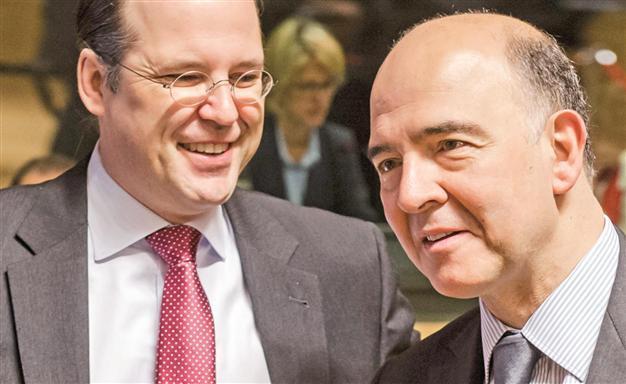EU finance ministers fail to agree on common bank rules
LUXEMBOURG - The Associated Press

Sweden’s Finance Minister Borg (L) talks with his French counterpart Moscovici during a meeting in Luxembourg. AP photo
European Union finance ministers failed to secure an agreement on how best to downsize or close banks without calling on taxpayers to bail out ailing lenders, a top official has said.Despite intense negotiations until the wee hours, ministers remained at odds over key points and will reconvene for an extraordinary session on June 26, French Finance Minister Pierre Moscovici said on June 21.
The breakdown in negotiations could undermine trust in Europe’s ability to stabilize its financial system.
Moscovici voiced confidence that ministers will be able to broker a deal then, but his Irish counterpart Michael Noonan cautioned that there were still “real issues” to be resolved.
“There is no guarantee there will be a solution on Wednesday,” he stressed.
Banking union
An agreement on the rules would have been an important step to stabilizing Europe’s financial system and establish a so-called banking union, which aims to give the supervision and rescue of banks to European institutions rather than leaving weaker member states to fend for themselves. It is a key part of the EU plans to restore financial and economic stability to the region.
The ministers at their meeting in Luxembourg sought to decide on new rules determining the order in which investors and creditors would have to pay for bank restructurings. A key stumbling block was who to hit hardest: Should losses be limited to banks’ shareholders and creditors, or should small companies and ordinary savers holding uninsured deposits worth more than 100,000 euros ($132,000) also be included?
The most controversial issue, however, proved to be how much leeway member states should be granted in making decisions on winding down banks. Some countries like Britain don’t want to be bound by rigid European rules. Other nations warned that too much flexibility would create new imbalances between the bloc’s weaker and stronger economies and destroy the project of establishing a single set of rules that creates certainty for investors and restores trust in the financial system.
Moscovici said “90 percent of the work” was done, although France and others were still pushing for greater flexibility. Noonan noted that there were still major disagreements between the members of the 17-nation eurozone and the EU’s ten other members like Britain that are not part of the currency union.
The ministers had vowed to resolve the issue by the end of June, thus the agreement on Wednesday’s emergency meeting.
Once the ministers finalize the legislation, they will then start negotiating the legislation with the European Parliament.
New rules to determine minimum level of funds
In addition to how much capital a bank must hold, the new European rules would also establish a minimum level of funds - be it capital, bonds, or deposits - that banks must have on their books to ensure that there’s always enough privately held assets on which losses can be forced, thus shielding taxpayers from the burden of propping up the bank.
Following the 2008-2009 financial crisis, countries like Ireland, Britain and Germany each had to pump dozens of billions of fresh capital into ailing banks to avoid the financial system from collapsing. Europe has already had to deal with problems involved in restructuring banks this year. Cyprus had to seek a rescue loan after it could no longer shoulder the cost of bailing out its banks.
The deal was rapidly overhauled, but holders of large deposits in some banks were forced to take harsh losses.
















